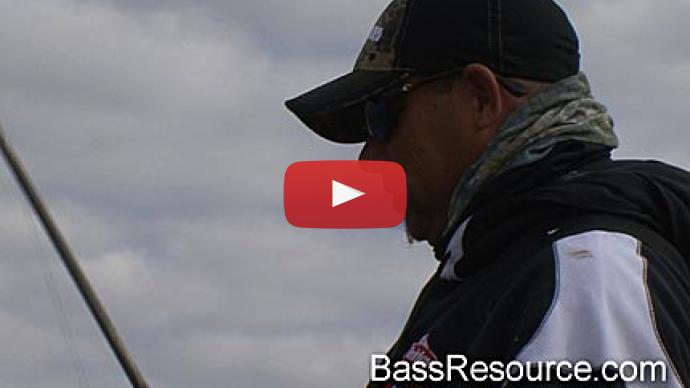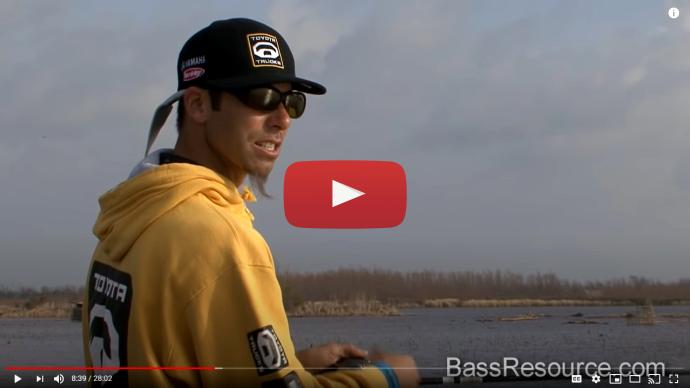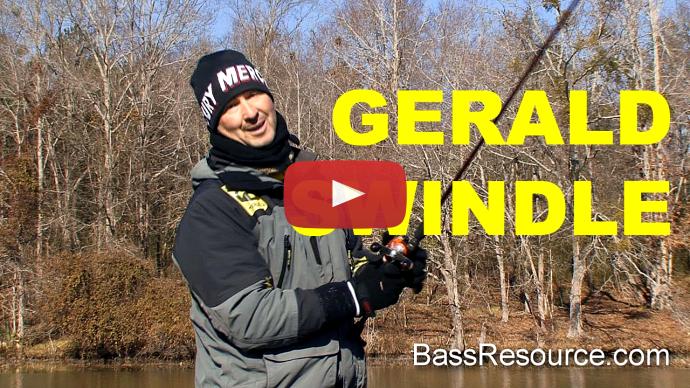In this episode, Bobby talks jig fishing techniques and tournament tactics!
Bobby: Hey, I'm Bobby Lane and I'm on BassResource.com today, and I'm going to answer your questions.
Glenn: Bobby, how far in advance do you start prepping for a tournament?
Bobby: Well, that depends. When I prep for a tournament, if it's around my home state, Florida, not very much at all, just because I know most of the waters and I just play the weather, really, for those tournaments. If one's out of a state, or that I'm not really familiar with . . . I'll prep.
Our off-limits are a month, of course, so if I need to make a phone call in between then and the tournament, I'll do that. With two and a half days of practice, you either got to be ready to go or take a serious butt-licking.
You do all the prepping you can, but I like to fish my strengths about anywhere I go. A tournament like this that's so important, and it can be a life-changer, I prep seriously for this one. Most of the other ones, it's basically just kinda run and gun as you go.
Glenn: What kind of things do you do to prep for a tournament?
Bobby: Learn what the lake's capable of, see what kind of baits they catch them on and what the lake has to offer. If there's some flipping to do, look and see where that's at, and time of year, if it's going to produce.
Throwing a spinnerbait or a jig, or something like that. Shallow, I like to look for what I like to do as far as fishing-wise, prepping for a tournament.
Glenn: What do you think tournament fishing could use the most right now?
Bobby: Probably just a good game plan for the future. Keep the youth involved, for sure. Make sure that they're taken care of.
A set of rules for the major tournaments that's written in stone, where there's none of this crap you hear of, oh, this or that, and a guy gets let off or, they didn't do anything. People get tired of hearing that, and it's not good for our sport when stuff like that happens.
A set of rules being number one, and number two, just . . .
Glenn: Enforcing them.
Bobby: Enforcing them, but you have to keep the youth alive also, or this sport will never go anywhere.
Glenn: What would you say is your least favorite technique?
Bobby: After winning Kentucky Lake two years ago, I don't think I have a least favorite technique anymore. I enjoy everything about fishing, and the more I learn about something that I don't like to do, the more I get confidence in it.
The Bassmasters Elite have made me a well-rounded fisherman.
It used to be anything with a spinning rod, but actually I enjoy fishing with a spinning rod when need be now.
Glenn: So you actually do own a spinning rod?
Bobby: I own a whole pile of them. Berkley actually came out with some new premiers this year, spinning reels, and they are outstanding reels.
I enjoy it. I'm not a great smallmouth fisherman at all, but the more I do it, the more I enjoy it. It's all fun to me anymore.
Glenn: Florida anglers such as yourself are known for being really good at flipping and pitching. But if you had one area of weakness, what would you say it would be? What body of water might that apply on?
Bobby: Probably smallmouth fishing. Anything that has to do with smallmouth. Those are big, big lakes, and it's tough to read.
[reeling in a fish]
Nice old Louisiana bass, little old fatty.
Smallmouth fishing is probably some of my tougher . . . they're just bigger lakes. You've got to use all kinds of different stuff. The Berkley Gulp, of course, is one of the best things to use period.
Drop-shotting and stuff like that, it makes it tougher for me to adapt than it does fishing freshwater with shallow water and stuff like that.
Glenn: When you're flipping and pitching a jig and the bite is really tough, what's one of the first changes you'll make?
Bobby: Either a smaller jig, or I'll go to a creature bait. I love to flip braid all the time. I'll switch from braid and go to a fluorocarbon or a mono, and see if that makes a difference. Or just totally get away from the jig and throw a shaky head or something like that.
Just to try to find out what the fish are doing and where they're at, and proceed to go back through with a jig and maybe soak up the bigger ones.
Glenn: When do you start playing with color or weights, weight size?
Bobby: When my practice is just pathetic, and the tournament starts in a day and I've got nothing to go to, it's time to make a change.
Glenn: What do you do to be more stealthy with regards to your trolling motor?
Bobby: Power-Poles, probably, are the most important thing. I'm not a guy that doesn't really care about being super-quiet, but when I get in an area, I'll drop my Power-Poles a lot more than I will, and use my Power-Poles to slow me down or start up. Something like that.
Just got the Power-Pole, run the trolling motor on high and drift to an area, and let my Power-Poles work from there.
Glenn: What are the costs for fishing the Elite series? What do you have to budget up front?
Bobby: Personally, I think you need about $85,000 just to pay your entries and survive your first year of the Elite series. To come out of it with or without checks, just to say you did it.
Glenn: That's where sponsors really come into play, then?
Bobby: Yeah. If you don't have sponsors . . . Guys do it on their own, some of them do all right at it. Some of these guys that are fresh out of the mix, they come in and be an Elite angler, and before they know it they're $40, $50,000 in debt.
Makes for a tough year.
Glenn: Here's a good question from one of our forum members. As a Florida fisherman who's known for shallow fishing in grassy water, where'd your confidence come from to fish the deep waters of Kentucky Lake for your win?
Bobby: Well, that goes back to, you get tired of taking your butt-kickings. I've had a win on Kentucky Lake, but that's the only check I've cashed out of four tournaments, or five maybe.
It's one of them where, I think I was pretty decent in the points that year. I wasn't really out of the Classic by no means. I was, I think, up around top 15 or something.
I gave it a shot. I got off my old way of fishing, went off-shore, and tried it and it worked.
That's the first time it's worked like that for me, but I did it this year again and did all right the first day. Never found enough to go to the next couple of days.
Some nice fishing here. I might not need to be sticking all these things.
That's probably a four pounder, wouldn't you think?
Glenn: Yeah.
Bobby: I think, probably close, isn't it?
Glenn: Look at the belly on it.
Bobby: Isn't that a beauty? I'm glad I don't have to be fishing deep here.
Glenn: Compared to Kevin VanDam and Shaw Grigsby, Gary Klein, you're a relative newcomer to the sport. Do you feel any additional pressure to win the Classic early on in your career?
Bobby: I don't know if it's called pressure, but you always want to win. I won my first Elite series. As soon as I came out of the gates, I battled in through a year, won Rookie in a year. Came close in a few events in Florida to winning, but missed them.
I don't feel the pressure to win. Tell me that on Sunday if I've got a shot at leading this tournament, and maybe I will then.
You want to fish to the best of your abilities at all times. The guys, Kevin VanDam, Skeet, Iaconelli, Hackney, and Gary, Shaw, they all want to win a Classic.
I know the pressure's on all of them, but I'm trying to become a better angler every year I'm out here and try not to make as many mistakes as I did when I was younger. I don't feel the pressure to win one, but I would love to win one.
Not that Gary's got any pressure on him, but I think he's at 28 or 29 Classics and hasn't had a win. Probably half the guys that ever fish for a living will never say they made that many Classics, so all and all he's a tremendous competitor just to make that many Classics in however many years he did it.
I'm ready, I'm hungry. I won one in 2009, and I won a few Opens and Strens and finished second in several Opens, and made it in enough top twelves in my career to say that I'm hungry for a tournament win for sure.
Glenn: What do you think your peers think about your early success?
Bobby: I hope they know it came from a lot of practice and diligence, and being confident in what you do. I love to fish. I think it's a God given ability that I have, and I'm trying to make the best of it.
I've had food poisoning the past two days in a row, so it's an honor, actually, just to be out here today and competing in the practice days instead of laying up in the bed like I've been doing for two days straight.
I just love to do it. When you have a bad tournament, you learn from your mistakes.
If you have a bad tournament, and you leave it knowing you didn't do anything different, you need to get your butt back out on the water and figure out so the next time you come, you'll have a better idea of what's going to happen when you get there.
These guys are relentless; they'll pound on you and pound on you. They don't care. They're out to get your money, just like I'm out to get theirs.
Glenn: If you're in a tournament and on that first day you don't do very well, how do you get your head back in the game?
Bobby: I'm a different type like that. I'll take a total flip-flop. If it didn't work the first day, I don't go back and try to make it work the second day. I'll gear up, have my head ready and tell myself I'm a better fisherman than what I was that day there.
Eight out of ten times, it works. Stay positive about things and don't get yourself in a rut. Everybody's going to have a bad day. I've seen the best guys in the world stumble, and stumble two days in a row, or two tournaments in a row.
At the end, they're always consistent. That means a lot.
There's another one. Feels like a big one, there. There's another one.
Glenn: How can you resist the urge to hook up on them?
Bobby: Well, I've seen two of them. You don't want to catch those kind of fish in practice, you want to catch them in the tournament.



